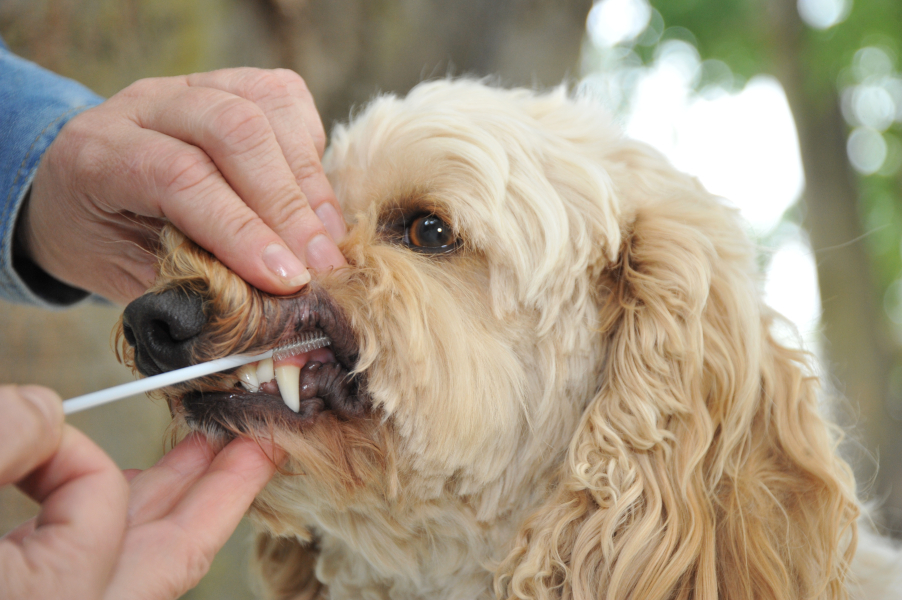Quick Summary
Click here for Price and Turnaround Time
Phenotype: Dogs with late-onset rcd4-PRA typically start showing signs of visual impairment between 5 and 12 years of age, with an average age of onset of 10 years. Vision loss can progress to complete blindness.
Mode of Inheritance: Autosomal recessive
Alleles: N = Normal, PRA = Progressive retinal atrophy (rcd4-PRA)
Breeds appropriate for testing: Australian Cattle Dog, Boykin Spaniel, Dachshund, English Setter, French Bulldog, Golden Retriever, Gordon Setter, Irish Setter, Irish Red and White Setter, Polish Lowland Sheepdog, Small Munsterlander, Standard Poodle and Poodle crosses, Tibetan Terrier.
Explanation of results:
• Dogs with N/N genotype will not have this inherited form of progressive retinal atrophy and cannot transmit this variant to their offspring.
• Dogs with N/PRA genotype will not be affected by this inherited form of progressive retinal atrophy but are carriers. They may transmit this variant to 50% of their offspring. Matings between two carriers are predicted to produce 25% rcd4-PRA-affected puppies.
• Dogs with PRA/PRA genotypes are expected to develop this form of progressive retinal atrophy and will transmit this variant to all of their offspring.
Sample Collection
Dog DNA tests are carried out using cells brushed from your dog's cheeks and gums. The preferred cytology brushes are sent to you by mail, or you may provide your own brushes. For accepted alternative brushes, click here
We recommend waiting until puppies are at least three weeks old before testing.

Step-By-Step:
- Make sure the dog has not had anything to eat or drink for at least 1 hour prior to collecting sample.
- When swabbing puppies, isolate each puppy from the mother, littermates and any shared toys for 1 hour prior to swabbing. Puppies should not have nursed or eaten for 1 hour prior to collecting sample.
- If collecting samples from more than one dog, make sure to sample one dog at a time and wash your hands before swabbing another dog.
- Label brush sleeve with name or ID of dog to be sampled.
- Open brush sleeve by arrow and remove one brush by its handle.
- Place bristle head between the dog’s gums and cheek and press lightly on the outside of the cheek while rubbing or rotating the brush back and forth for 15 seconds.
- Wave the brush in the air for 20 seconds to air dry.
- Insert brush back into sleeve.
- Repeat steps 5 - 8 for each unused brush in sleeve on a fresh area of cheek and gums. Make sure to use and return all brushes sent by the VGL. In most cases, it will be 3 brushes per dog. If using interdental gum brushes, please note that the VGL requires 4 brushes per dog and only moderate or wide interdental gum brushes are accepted.
- Do not seal brushes in sleeve.
- Place all samples in an envelope and return to the address provided.
ATTENTION:
- Do not collect saliva/drool – the key to obtaining a good sample is getting cheek cells on the swab
- Do not rub swab on the dog’s tongue or teeth – this will result in poor quality sample
- Do not collect a sample from a puppy that has recently nursed – the mother’s genetic material can rub off on the puppy’s mouth and contaminate the sample
Progressive retinal atrophy (PRA) is a term used to describe a group of inherited disorders of the retina, characterized by progressive retinal degeneration and consequent blindness. More than 20 mutations in various genes have been associated with PRA in dogs.
Progressive retinal atrophy rod-cone degeneration 4 (rcd4-PRA) is a heritable condition caused by a single-base insertion in the C2orf71 gene (c.3149_3150insC) that leads to a frameshift and the production of a shorter protein than normal.
The variant was first identified in PRA-affected Gordon Setters and found to also be present in PRA-affected Irish Setters who did not have the Irish Setter rcd1-PRA mutation. Although this variant explained a majority of PRA-affected Gordon Setter dogs, a few affected dogs did not have this mutation, suggesting that late-onset PRA in Gordon Setters may be caused by more than one genetic variant.
The disorder is characterized by late-onset degeneration of photoreceptor cells in the retina, leading to loss of vision and eventually blindness. Age of onset for rcd4-PRA is quite variable in Gordon Setters and dogs with this disease can start showing signs of visual impairment between 5 and 12 years of age, with an average age of onset of approximately 10 years.
The disease is inherited in an autosomal recessive fashion and two copies are required for an animal to be affected, with both sexes being equally affected. Dogs with one copy of the C2orf71 variant are considered carriers and unaffected. However, breeding two carriers together is expected to produce 25% affected offspring and 50% carriers.
Testing recommendations: Testing for rcd4-PRA assists owners and breeders in identifying affected and carrier dogs. Breeders can use results from the test as a tool for selection of mating pairs to avoid producing affected dogs.
